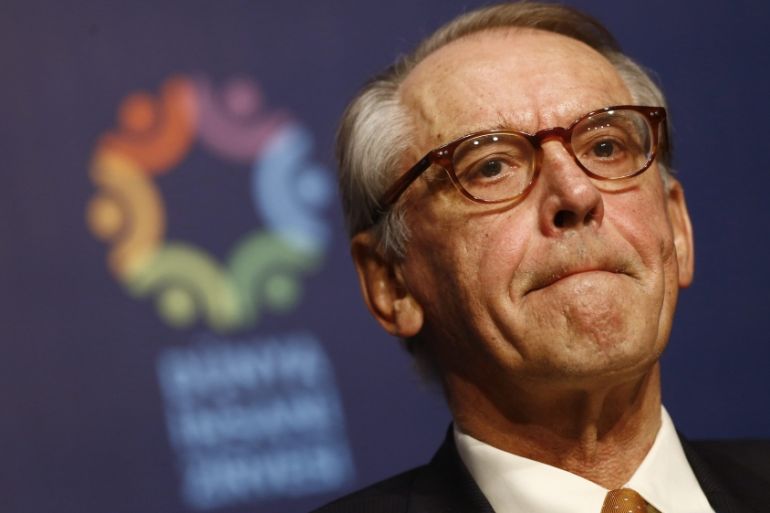Building a better future for Syrians in Turkey
The Istanbul Summit will be an opportunity to help the next generation get back on its feet.

As thousands leave Syria for safer lands, images of white tents and perilous boat journeys have flooded the world’s media.
But there’s another side to this story. In Turkey, the host of today’s World Humanitarian Summit, only about 10 percent of the approximately 2.75 million displaced people from Syria live in refugee camps (PDF). The rest live in towns and cities like many of us.
Keep reading
list of 4 itemsDoes Israel’s Netanyahu have a plan for a ‘day after’ the war on Gaza?
Why Egypt backed South Africa’s genocide case against Israel in the ICJ
US sanctions two RSF commanders as fighting escalates in Sudan’s Darfur
Across the country’s southeast, Syrians are silently trying to make a living and blend in.
Imagine this: You have new neighbours that you would like to know, but the language barrier and customs make it difficult to reach out. Or you want to find short-term employment, but until recently, obtaining a work permit was nearly impossible. These are real-life situations faced by hundreds of thousands of ordinary men and women.
Syrians now represent more than 50 percent of the population of Kilis and 22.5 percent of the population of Gaziantep. Over the last five years alone, more than 150,000 babies of Syrian parents displaced by the conflict were born in Turkey.
A long road for integration
As the crisis on the other side of the border grows in intensity, Turkey has been implementing much broader measures to help Syrians in need. As of February, the country had spent $10bn on Syrians under temporary protection, providing them with free healthcare and allowing them to attend schools, universities and training courses.
At the beginning of this year, the government passed legislation allowing Syrians to apply for work permits.
The international community needs to look beyond emergency aid and invest in the longer-term planning necessary to create a sustainable and liveable environment for both Turkish citizens and Syrians living here.
But with no end in sight to the conflict in Syria, it isn’t clear how the situation will evolve. What is certain is that massive investments will be required in Turkey to build peace, sustain the economy and ensure adequate public services for both Turkish citizens and Syrians.
Ensuring the dignity and quality of life of the displaced, and supporting the environment in which they live should go hand in hand. That includes boosting the labour market, skills and capital, social services and local institutions.
Take access to jobs: Competition for low-skill employment is on the increase. For instance, many Syrians and Turkish citizens work side-by-side in southeast Anatolia in the construction industry and as manual labourers. The region will need to create 260,000 more jobs to keep unemployment down and the economy afloat between now and 2018.
This will require creating new areas of work so the economy can take off, while training both displaced and locals in sectors such as agriculture, food processing and the clothing industry – all of which hold the promise of employing large numbers of people.
OPINION: World Humanitarian Summit and Turkey
Public services will also require a rethink. For instance, the 113,000 Syrians living in camps in Kilis, Gaziantep and Sanliurfa are generating huge amounts of solid waste. Vehicles are constantly on the road, personnel are overwhelmed, and sanitary landfill sites are at full capacity. There is an urgent need for improving rubbish collection and disposal.
In addition, the construction of new hospitals and the addition of medical and non-medical workers to staff them could add some 18,000 jobs locally, while new schools could help recruit another 20,000.
Much more needed
The European Union, the governments of the United States and Kuwait, the United Nations Development Programme and others are trying to do that. They’ve established training programmes to help displaced women and men and those in local communities find jobs.
OPINION: Humanity should learn from refugees
These include Turkish language courses to boost economic opportunities. They are also helping cities redesign their public services to cater to large numbers of people, starting with ambitious waste and recycling programmes.
But much more needs to be done. The international community needs to look beyond emergency aid and invest in the longer-term planning necessary to create a sustainable and liveable environment for both Turkish citizens and Syrians living here. By the same token, it would help create a more secure and peaceful environment for all.

Across the world, the average length of time a displaced person spends away from home is now 17 years. Think about the 10-year-old Syrian girl and her 10-year-old Turkish neighbour. If this average timeframe holds true, they may still be neighbours as young adults.
So let’s not leave them behind. The Syrian crisis has resulted in huge amounts of suffering and need. The Istanbul Summit will be an opportunity to help the next generation get back on its feet.
Turkey can and should also capitalise on the talent, skills and life experiences of displaced Syrians to build a bright future for Turkey.
Kamal Malhotra is the UN Resident Coordinator and UNDP Resident Representative in Turkey.
The views expressed in this article are the author’s own and do not necessarily reflect Al Jazeera’s editorial policy.
